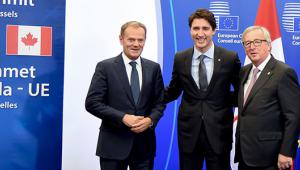The European Parliament’s economics and legal affairs committees approved the legislation by 38 votes to 9, with 38 abstentions, with the next stage in the process being a debate in front of the full parliament.
Campaigners had been applauding the legislation for its provisions requiring large multinational companies to publicly disclose information about the tax they pay in each country in which they operate, including those outside the EU.
However they have now criticised the introduction of an amendment, tabled by the parliament’s liberal party as a compromise to the conservatives, which will provide a get-out clause for this requirement.
Elena Gaita, policy officer for corporate transparency at Transparency International EU, said the last-minute amendment “makes the text about as watertight as a sponge”.
Companies will be able to apply for a temporary stay on disclosure of legislation that is “commercially sensitive”. If approved, the exemption will last for one year, but can be renewed an unlimited number of times.
Jean-Marie Cavada, coordinator of the Legal Affairs Committee for the Alliance of Liberals and Democrats for Europe, and shadow rapporteur in that committee, said the exemption will be “limited and temporary”.
“The European Commission shall make sure that these derogations are not excessively granted,” he continued.
Before yesterday’s vote, the legislation had been hailed as a landmark step towards a strong requirement for public country-by-country reporting.
Tax and transparency campaigners have long called for such a measure, which would make a company’s tax arrangements clearly visibly and thus restrict its recourse to employ tax avoidance schemes.
It would also set the EU apart from most others in terms of tax avoidance legislation. The OECD, for instance, advocates country-by-country reporting, but with reports shared only between relevant tax authorities.
If passed, companies operating in the EU with a turnover of more than €750m will have to make detailed information on their operations in each country publicly available, including their activities outside of the EU.
Liberal MEPs tabled the last-minute amendment in order to secure this latter feature, which had been proposed by the socialist party but objected to by the conservatives. The clause on the disclosure of commercially sensitive information was offered as a compromise.
“With this fair compromise we protect our companies’ competitiveness without creating loopholes in legislation,” said the Liberials’ Cavada. “After all, the overarching goal is to have a fair, transparent and efficient corporate tax system to ensure the effective functioning of the EU single market.”
Dariusz Rosati, of the European People's Party, explained that the EPP backed the amendment because otherwise EU companies would be put at a competitive disadvantage to their rivals operating in non-EU jurisdictions.
"We decided that a safeguard clause is needed to protect the interest of EU companies and to offer them a possibility, on a reasoned request, to protect their commercially sensitive information," he said. "The EPP supports transparency but we would not accept irresponsible socialist proposals that clearly discriminate against EU companies and harm the investment climate in the EU."
He said the amendment ensures the clause will not be abused by requiring member states to justify any exemptions to the EU's exeucitve arm, the European Commission, and that the commission would issue strict guidelines on this.
But campaigners said the amendment went too far, potentially undermining the whole proposal. The legislation also needs to be passed by the parliament, and then negotiated with member states, where they warned it risks being watered down further.
Tove Maria Ryding, tax coordinator at Eurodad (the European Network on Debt and Development), called on MEPs to fix the loophole.
“Failing to stop large-scale corporate tax dodging doesn’t only mean that we lose funding for public services around the world,” she said. “It also disadvantages the small and medium enterprises, which struggle to compete with large multinational corporations that are not paying taxes.”














